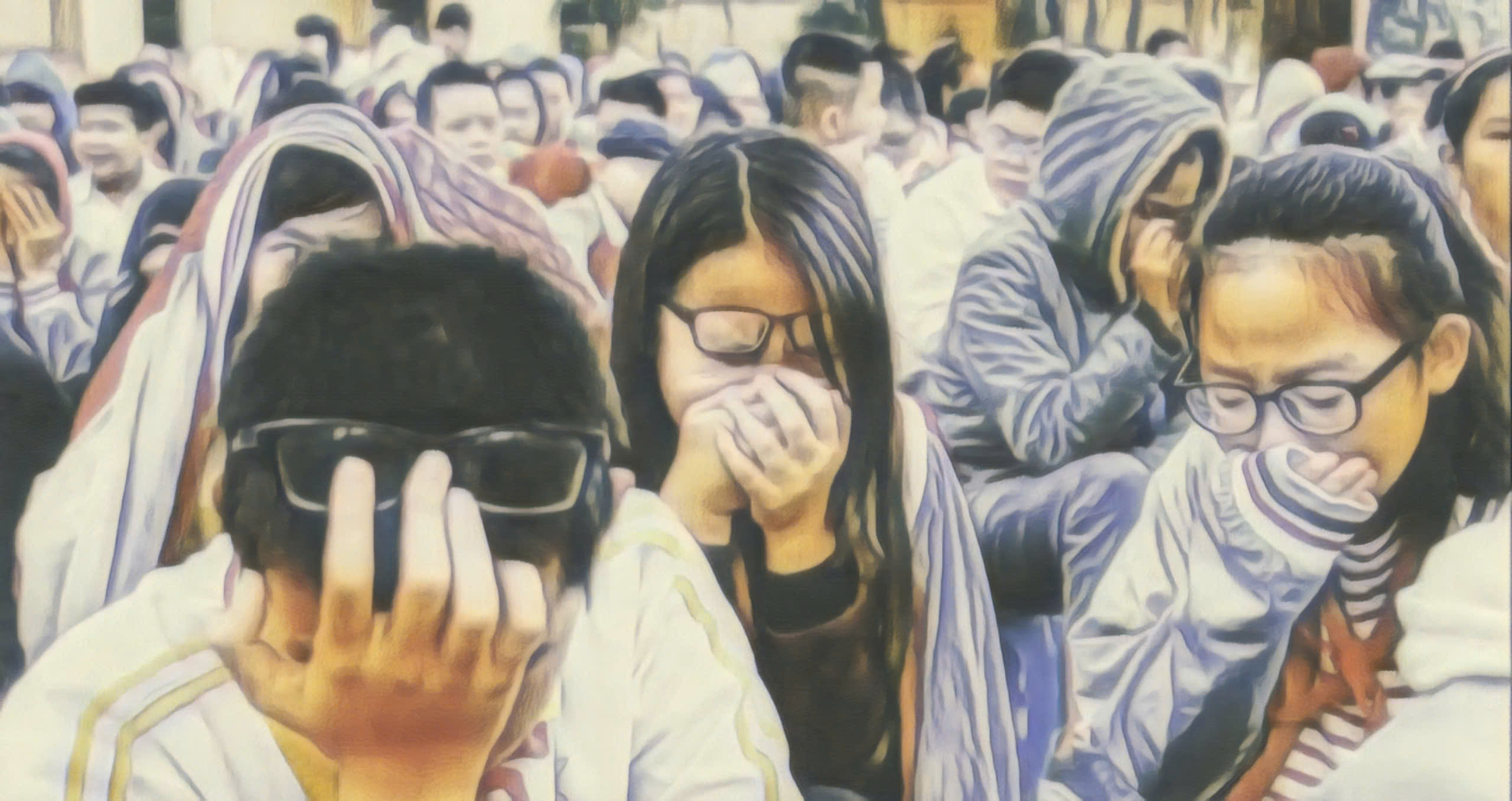The fact that some speakers come to schools and intentionally bring tears to students' eyes with sad stories, even filming them as proof of the success of the talk, is causing much controversy.
For many years now, the image of a series of students shedding tears when listening to a speaker telling a touching story about their parents has become familiar. Some speakers even invite students to stand in front of the whole school to demonstrate, asking them their names, how long it has been since they gave their mother a gift, and thanking their father.
TEARS SHOULD NOT BE USED AS A MEASURE OF THE EFFECTIVENESS OF EMOTIONAL EDUCATION
Educator Nguyen Thuy Uyen Phuong, Chairwoman of the ICS School Board and founder of the TOMATO Kindergarten and Extracurricular School System, affirmed that the good news is that in recent years, moral and skills education for students has been increasingly valued. Schools and parents realize that only providing knowledge without educating children about compassion and personality will create important deficiencies in children's development. Skills such as empathy, patience, or the ability to resolve conflicts are indispensable factors for students to be successful and happy in life. However, Ms. Phuong is very concerned that many schools today prefer to invite speakers to the school to tell emotional stories that make students cry en masse.

Making students cry, is that an effective way of education?
"Although it is very important to touch the hearts of students, if they do not feel the deep reason and understand clearly why they need to live by those values, they will not have enough motivation to turn them into actions. But in my opinion, tears should not be used as a measure of the effectiveness of emotional education. Because the final true measure of an educational process must be the real change in the actions and thoughts of each student, not whether they cry or not. It is not difficult to make students cry with tragic stories or touching situations, but the important thing is how to help students turn those tears into practical actions and long-term awareness," said Ms. Phuong. At the same time, according to her, in reality, changes in students' personality and life skills do not easily happen immediately after a short talk, but need time to penetrate deeply into each student and need many reinforcing activities afterwards to create sustainable transformation. This process cannot be forced, cannot be rushed…
X IMPORTANCE IS PRECIOUS, BUT…
Dr. Nguyen Thanh Nam, a lecturer at the Military Technical Academy, who has worked for many years in the fields of culture and education, believes that sincere emotions before the true values of life are always precious and need to be preserved. Most of the above programs convey positive messages to students, in which they promote family affection, teach gratitude and responsibility towards parents. These are important moral values that need to be taught to students, especially in the context of people increasingly distancing themselves from their families due to the influence of technology and modern life. However, it is necessary to distinguish it from impulsive emotions like "being possessed".
According to Dr. Nam, psychology has studied the phenomenon of "crowd psychology" and the results show that when in a crowd, people tend to integrate into the group and lose their sense of individuality. That makes many people perform exciting, unusual behaviors that they might not do when alone. When people around them express high emotions towards an object or phenomenon, those emotions quickly spread and affect all members of the crowd. Emotional waves spread, respond back and forth, combine and resonate like waves on the surface of water. The crowd effect is stronger when the members are people with little knowledge and experience, such as students.
Mr. Nam stated his opinion: "Many people have taken advantage of the crowd's emotional copying mechanism to manipulate emotions and control the behavior of others. The purpose of this can be good or bad, can bring benefits or cause harm, depending on the specific situation and context. However, taking advantage of emotions is an anti-educational act."

According to experts, it is not advisable to encourage the implementation of life skills education programs in the form of making students cry en masse in schools.
EVERYONE'S TEARS MEAN
Ms. Tran Thi Que Chi, Deputy Director of the Institute of Educational Sciences and Training (IES), said that anyone's tears have meaning. For adults, in some conversations, tears can evoke emotions, creating empathy between people. For children, sometimes tears can also help them realize lessons in family behavior, reason, and lessons of being a child. However, if this method is not careful, it can have negative effects, and children can be psychologically damaged. Students in puberty, whose psychology and physiology are changing, in some cases are invited by the speaker to stand up in front of hundreds of other students to demonstrate, and use as an example of not caring or not being grateful to their parents, then this student can be embarrassed, hurt, and teased and ridiculed by friends. This can increase the risk of isolation and bullying at school, gradually causing them to lose trust in adults. "In education, even from preschool level, it is taboo to demonstrate on children," Ms. Chi emphasized.
According to Dr. Nam, education through tears can reduce the value of the message. Many students, after an acute emotional episode, when they wake up, feel led and deceived, and may develop negative emotions. Therefore, according to Mr. Nam, it is not advisable to encourage the implementation of life skills education programs in the form of making students cry en masse in schools. (continued)
What do students and teachers say?
If a speaker makes me cry, I think it is also a success because they have touched my heart, awakened something in me, but it does not mean that those who do not make me cry have a useless talk. I think that many normal students only dare to cry secretly, but when they come to a talk, they can cry publicly, cry with many other people, so it is not necessarily a bad thing. Maybe that person is crying not because of pain but because of happiness, so what? Just cry because you are still moved, not callous. However, I think that crying is just an initial expression of emotions, and speakers should stop making students cry at a certain "level". For example, there are times when they are emotional, sometimes happy, positive, but do not only see them crying in pain from beginning to end, that is too cruel. I also think that for students, moral education and life skills need a long-term solution and a journey, not just 1-2 talks...
Le Nguyen Uyen Thu (Student of Trung Phu High School, Cu Chi District, Ho Chi Minh City)
Emotional abuse in children's education can cause many harmful effects. Constantly evoking sad stories and painful images can unintentionally create negative emotional anchors in students' minds. They can be haunted by these stories, leading to anxiety, fear, and even depression. Some speakers often use accusatory statements such as "You are happy but do not know how to appreciate it", "Your parents sacrificed so much that you are spoiled"... These statements can make children feel guilty, ashamed of themselves, affecting their self-confidence and healthy psychological development.
Master of Linguistics Nguyen Mong Tuyen (Creative Writing Class Teacher)
I am concerned that many people film, take photos, and use videos of students crying while listening to speakers and then post them on YouTube, TikTok, and social media. This violates the students' privacy.
Ms. Phuong Anh (parent living in District 8, Ho Chi Minh City)
Source: https://thanhnien.vn/dung-nuoc-mat-giao-duc-tre-em-loi-bat-cap-hai-185250205182819256.htm


![[Photo] President Luong Cuong receives Ethiopian Prime Minister Abiy Ahmed Ali](https://vstatic.vietnam.vn/vietnam/resource/IMAGE/2025/4/16/504685cac833417284c88a786739119c)

![[Photo] Opening of the 4th Summit of the Partnership for Green Growth and the Global Goals](https://vstatic.vietnam.vn/vietnam/resource/IMAGE/2025/4/16/488550ff07ce4cd9b68a2a9572a6e035)
![[Photo] Many practical activities of the 9th Vietnam-China border defense friendship exchange](https://vstatic.vietnam.vn/vietnam/resource/IMAGE/2025/4/16/3016ed3ef51049219574230056ddb741)

![[Photo] North-South Expressway construction component project, Bung - Van Ninh section before opening day](https://vstatic.vietnam.vn/vietnam/resource/IMAGE/2025/4/17/ad7c27119f3445cd8dce5907647419d1)

























![[Photo] General Secretary To Lam attends conference to meet voters in Hanoi city](https://vstatic.vietnam.vn/vietnam/resource/IMAGE/2025/4/17/889ce3da77e04ccdb753878da71ded24)
![[Photo] President Luong Cuong receives Lao Prime Minister Sonexay Siphandone](https://vstatic.vietnam.vn/vietnam/resource/IMAGE/2025/4/17/337e313bae4b4961890fdf834d3fcdd5)























![[Video] Viettel officially puts into operation the largest submarine optical cable line in Vietnam](https://vstatic.vietnam.vn/vietnam/resource/IMAGE/2025/4/17/f19008c6010c4a538cc422cb791ca0a1)








































Comment (0)